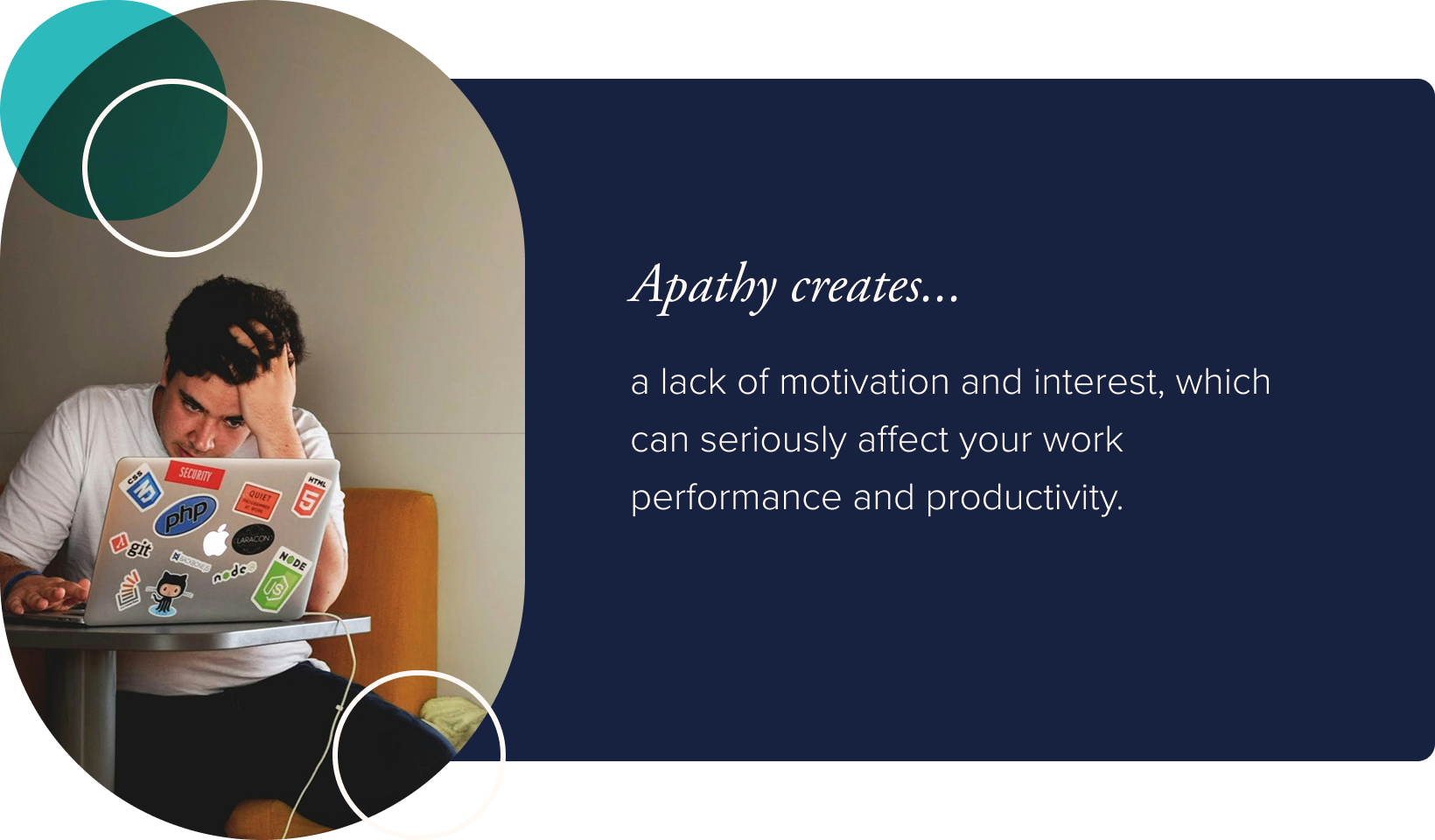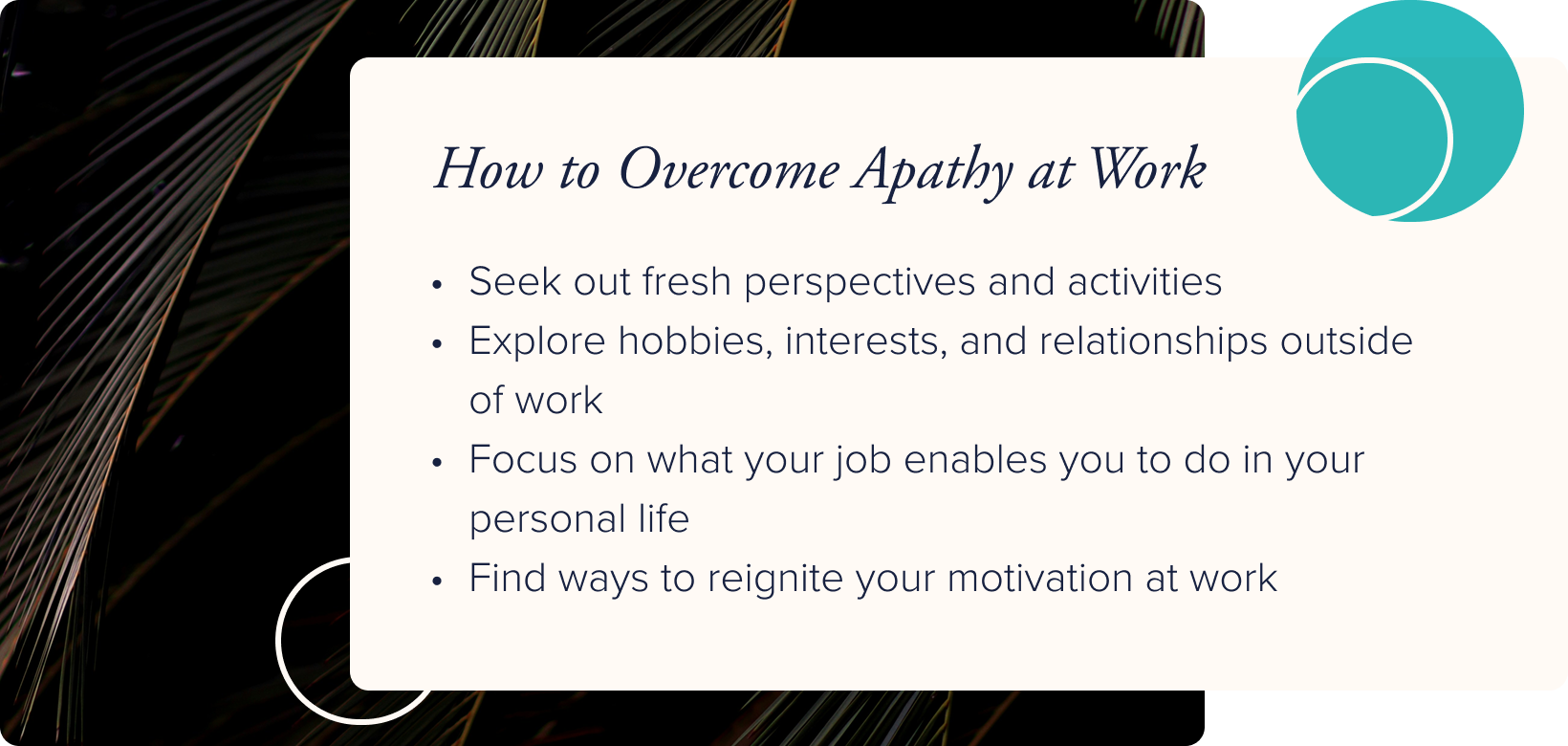
Apathy at Work—What It Is, Where It Comes From, and How to Overcome It

One-on-One Counseling in Arizona for Life's Challenges
Every day is a chance to start over. Our trauma-informed therapists will meet you where you are — in person or online — so you can process your experiences and become the person you want to be.
Do you feel like you’re simply going through the motions at work? Have you stopped caring about the quality of your work or whether it gets noticed? If so, then you may be experiencing apathy at work.
Over time, apathy in the workplace can lead to serious consequences if it’s left unaddressed. To help you recognize the signs and take action, let’s take a look at what apathy is, where it can come from, and how to overcome it.
What Is Apathy?
Apathy is often described as a lack of interest or enthusiasm. It occurs when someone feels emotionally disconnected or indifferent toward things that would normally matter to them.
In simple terms, apathy is when you stop caring. You might still go through the motions, but you don’t feel invested, excited, or even bothered. You may feel apathy at work if you’re doing just enough to get by and don’t really care about growing or challenging yourself.
Examples of Apathy at Work
Apathy at work can manifest itself in many different ways, and some of the major signs to look for include:
- Boredom
- Depersonalization
- Spacing out
- Low energy
- Giving the bare minimum
- Inattention to details
These signs might not seem noticeable at first, but they often grow into larger issues over time. This is why it’s important to recognize these signs before they develop into serious consequences that can affect both you and your coworkers.

Read our related article to learn how to deal with a difficult coworker.
Consequences of Apathy at Work
Apathy creates a lack of motivation and interest, which can seriously affect your work performance and productivity. It often results in:
- Slower work
- Frequent mistakes
- Missed opportunities
When apathy leads to consistently poor performance, it can even put your job at risk and result in getting fired.
Apathy can also take a toll on those around you. A lack of enthusiasm can make collaboration difficult, and your colleagues may feel frustrated and unsupported. This creates a negative workplace atmosphere where teamwork suffers, morale declines, and overall productivity drops.

Read our related article to learn how to deal with toxic positivity in the workplace.
Why Do People Become Apathetic at Work?
Apathy at work can stem from a variety of sources, including:
- You feel like your job is no longer fulfilling
- You have other things on your mind
- You feel undervalued or unrecognized
- You lack a sense of purpose or direction
- You feel disconnected from your team
In general, apathy usually develops after a prolonged period of dissatisfaction or frustration. At first, you may feel as though you’re mentally and emotionally checked out. Over time, you stop believing that anything will change, and your motivation to put effort into your work fades.
Underlying Causes of Apathy at Work
Sometimes, apathy at work can be a single symptom of an overarching mental health issue. Some of the mental health issues that can lead to apathy at work include:
- Burnout
- Depression
- Anxiety
- Bipolar Disorder
- PTSD
- ADHD
If you’re also experiencing the hallmark signs of apathy outside of work, like low energy, depersonalization, or spacing out, then it may be worth exploring whether there’s a deeper mental health concern at play. Speaking with a mental health professional can help you better understand what you're experiencing and why you feel the way that you do.
Read our related article to discover the signs of workplace anxiety.
How to Overcome Apathy at Work
Overcoming workplace apathy starts with self-awareness and identifying its root cause, which can vary from person to person. Without this understanding, it can be difficult to figure out how to feel passionate about your job again.
If you feel as though your apathy is stemming from burnout, depression, or another mental health disorder, then it’s important to seek help from a mental health professional. If your apathy is mild and work-related, then there are few strategies that you can use to re-engage with your work.

Read our related article to answer the question: What is burnout?
Discover New Ways to Enjoy Your Work
One strategy for overcoming apathy at work is to seek out fresh perspectives and activities that can reignite your interest and motivation. Some of the ways that you can do this are by:
- Challenging yourself with new duties
- Taking on a passion project
- Getting rid of what no longer serves you
- Working towards getting a raise
- Working from home
Trying new approaches or focusing on what you find rewarding helps break the cycle of boredom and disengagement, and it can make your daily tasks feel more engaging and rewarding.
Find Fulfillment Outside of Work
Sometimes, apathy at work comes from placing too much of your identity or happiness solely on your job. Exploring hobbies, interests, and relationships outside of work can provide a sense of purpose and joy that balances your overall well-being.
Another way to do this is by shifting your focus away from the daily tasks that you perform at work and focusing on what your job enables you to do. When work feels unrewarding, consider the experiences and lifestyle that your work and income allow you to have.
Reignite Your Motivation at Work
Motivation doesn't always come from the work itself, but it often comes from how you approach it and what you connect it to. Some of the ways that you can reignite your motivation include:
- Setting personal challenges to keep things interesting and push yourself to grow
- Setting clear, meaningful goals to give your tasks a sense of purpose
- Building strong relationships with coworkers to create a sense of camaraderie
- Celebrating small wins to stay encouraged
- Taking ownership of your work and finding pride in doing things your way
By shifting your mindset and being intentional about how you engage with your work, you can start to rebuild your motivation and reconnect with your sense of purpose.
Overcome Apathy at Work With Inner Balance
When apathy starts impacting your ability to concentrate, complete tasks, or meet responsibilities, it’s a sign that something deeper may be going on.
At Inner Balance, we can help you understand where your apathy is coming from and discover ways to defend against it in the future. Whether your apathy is work-related or a symptom of a mental health issue, it’s possible to feel better with the right tools and support.
Reach out today to connect with our compassionate team and take the first steps towards mental wellness.
Related blog articles
Sign up for our newsletter
Sign up with your email address to receive news and updates.
Get started
Request a consultation

-03%201.png)




